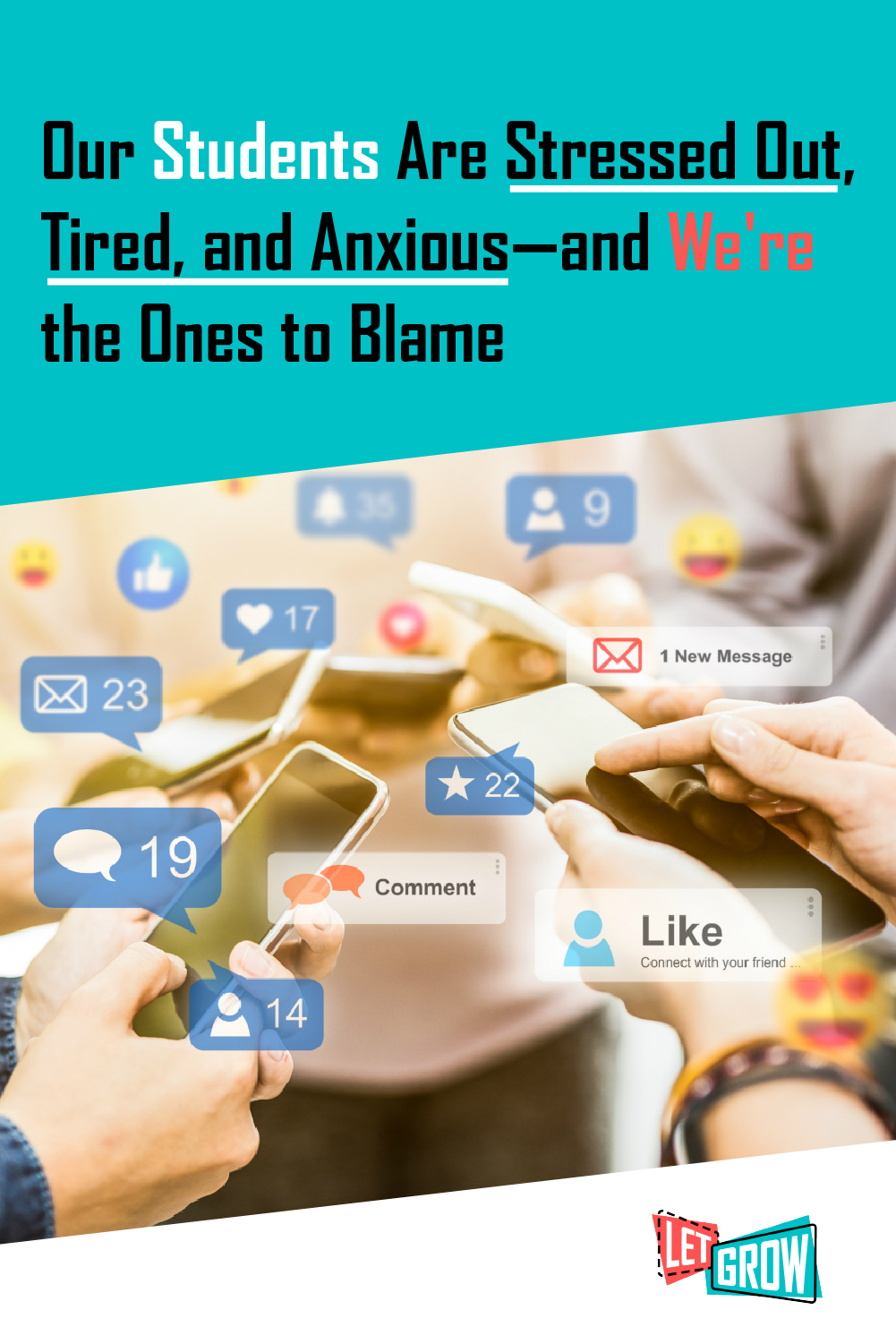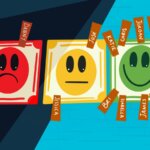






Our Students Are Struggling with Social Media and Anxiety—and Adults Are the Ones to Blame
While teaching a lesson on stress the other day in class, I posed a question to my 7th graders:
“Do you think you have more or less stress than your parents did when they were your age?”
Their initial answer was clear and direct,” Yes. We have way more stress than they ever had.”
My next question was more specific:
“What stressors do you have?”
They responded with answers about school expectations, friend groups, and general family issues. So I asked them, “Do you think that your parents didn’t have to do well in school or have friend and family issues?”
It got them thinking. What was the difference between the stress their parents dealt with versus the stress and anxiety they had to deal with in2020? And that’s when one student figured it out:social media.
With social media, you are constantly being compared and comparing yourself to others.
Social comparison is a normal part of society. After all, “keeping up with the Joneses” is a cliche for a reason. But typically, this exposure to others— their purchases, achievements, daily life #wins, etc.—has been limited by proximity. But with social media, it doesn’t matter if someone is around the corner or on the other side of the world (posting vacay pics). We are exposed to the Joneses constantly—and so are our kids.
One student argued that when her parents were kids, social comparison was not like it is today. Sure, there might have been comparisons every once in a while to friends or neighbors. But she said that today’s kids are constantly compared to what others—even kids they don’t know—have so-called achieved, whether it’s real or not.
I couldn’t help but think that maybe my 12-year-old students were onto something. With the anxiety occurring in our youth at a near-epidemic level, I had to wonder if social media could be the leading cause.
My 7th graders seemed to validate my suspicions. One student told me that social media serves as a constant comparison, not only for them but for their parents. They told me that their parents are constantly obsessing on “mom” pages and then pressuring their children to achieve what other parents are posting about.
Dr. Daniel Hutt is a clinical social worker and has a lot of experience working with kids with anxiety. He refers to this “as comparing yourself to an avatar that doesn’t really exist.”
Using social media to always compare yourself to others leaves little time for students to engage in everyday activities, like playing, going out in nature, and just relaxing with friends, just for fun.
Academic demands and expectations are out of control.
Students have adapted a good-grades-at-any-cost mindset. Earlier and earlier, I’m hearing conversations about getting into a good college, having perfect grades, and doing whatever it takes to succeed.
This is where things like grade inflation comes into play. For instance, if Mike’s mom posts that he has 100% in his class, then other parents are going to expect their kids to achieve the same. Perhaps Mike cheated, or did several extra credit assignments, or is just really smart But unbeknownst to Mike’s mom, she’s just created a problem, not only for other students, but for teachers like me, too.
On one hand, you might think that this is encouraging to students and makes them feel good and accomplished. But in reality, they say it makes them feel even more anxious because they’re constantly trying to produce something worthy of posting. Some students even told me they feel like their parents won’t be proud of them or love them if they don’t do really amazing things.
Now parents of the other students are mad that their kids don’t have a score as high as Mike’s. They might even harass or threaten the teacher if their child’s grade doesn’t improve. Yes, really.
To keep up with these unreasonable parental academic expectations, many schools have lowered their expectations on students. They don’t want to deal with irate parents, so they keep parents satisfied with high grades and test scores, even if it doesn’t accurately assess the student’s ability.
Sure, it might be great that parents and students are receiving immediate gratification, but as a teacher, I see this as a problem. I feel like we’re doing a disservice to kids because we’re not properly preparing them for the future. We aren’t encouraging good time-management or organizational skills that they’ll surely need later on in college and in life. Instead, we’re coddling and enabling our students.
Constant competition and social media comparisons go well beyond the classroom.
It’s not just about academics or comparing students in the classroom. Kids today are being compared in every aspect of their lives. Like sports—that’s a big one. It feels like you can’t go on social media without a parent boasting about how good their child is at a sport or about the AAU or club team their child is on. Sometimes those are just proud parents, posting something generally positive. But more often than not, it’s meant to showcase or prove their child’s high level of achievement.
One of my students told me, “I got off of all of my social media because I was constantly comparing myself to everyone, and my anxiety was through the roof. It was making me depressed because I couldn’t feel good about myself.”
Another student told me, “Social media has made me lonelier than ever.” And yet another said she thinks her generation “is the loneliest ever in history.”
According to the American Journal of Preventive Medicine, people who spent two or more hours a day on social media were considerably more lonely than those who only spent 30 minutes or less. Students are reporting fewer close connections with others IRL (in real life), which results in increased anxiety overall.
It’s no wonder anxiety is rising among teens.
Anxiety is no longer the exception—it’s the norm for many kids.
Another aspect contributing to student anxiety is the overexposure to fake news. Media literacy is important, but it’s just not happening. So students see things on social media and online that just makes them nervous and scared. Often, parents aren’t helping either. Many of my students tell me their parents catastrophize everything, leaving them fearful of even the smallest things.
In addition, I’m seeing that anxiety is often becoming fashionable, if you can imagine such a thing. Don’t get me wrong, anxiety is a very real and serious issue for many. But it’s almost become a buzzword.
In fact, for many, I almost see it as a badge of honor. Some parents seem to be under the impression that if their child doesn’t suffer from anxiety, then they’re not driven or working hard enough.
I’ve spoken with many colleagues, students, and parents about this topic, and I feel like everyone is telling me their child suffers from anxiety these days. As an educator, I worry if it’s an overused term. And if so, is it undermining kids who are really struggling?
Anxiety is clearly a real issue in today’s society, but I think we need to ask ourselves what it means. Is it a term that indicates drive or success? Is it a label to compare one kid to another? Maybe our kids are just feeling stressed, like we did as kids. When do they truly require a mental-health diagnosis?
Enough is enough. Let’s lose our obsession with social media and anxiety.
We are constantly telling students, with our words and our actions, what they must do to compete in this world. This has turned into helicopter parenting, lawnmower parenting, and a lot more hovering in general. As a result, our kids are far less prepared to survive in this world on their own.
One of my students said about her parents, “I just wish they would let me figure it out on my own instead of always rushing to give me the answer.”
I have to say, I think that’s sound advice. In a society where 1 in 3 teenagers is diagnosed with anxiety and the suicide rate has increased by more than 50% in the past 10 years, it’s imperative that we turn the tides to help our children.
Hutt says parents can help. “It is a parent’s responsibility to teach their children to become autonomous and self-governing,” he says. “Teach them safety skills and not to oversensitize our children to potential dangers in the world.”
Realistically the world is safer today than ever before. However, social media often tells a different story, and it’s not helping any of us. It’s actually even hurting our children’s social and emotional development.
So what are some things we can do to help our kids positively engage with social media and deal with anxiety?
After talking to many other teachers, parents, and students, I put together a few solutions. In fact, the best suggestions came from my students. Here are a few things we can do.
Limit social media.
This is the single biggest thing we can do now. Limit social media at school. Have kids put their phones away at night. We just don’t need so much social media.
Discuss real versus fake news.
It’s time to take a closer look at media literacy, both at home and in our schools. Here are some resources for that.
Tell your kids you love them no matter what.
This might seem obvious, but kids need to hear it. Tell them you’re proud of them, whether or not they’re doing something that is “postable.”
Help kids develop protective factors.
This includes self-esteem and confidence. You want them to be able to handle anything that comes their way.
Let them figure it out on their own.
As adults, we often want to step in, but we need to let kids learn from their own mistakes. In addition, don’t be afraid to mess up in front of your children. Let them see you make a mistake and recover. Let them see you laugh about it. .
Don’t compare.
It’s so easy to do this. It’s natural. But try to limit comparing and pressuring your kids to be like others that you’re seeing on social media. And don’t get into comparing or counting likes on a post. If your kids do this and you can help them break this habit, great!
Have face-to-face conversations with your child.
It’s still important for kids to be able to communicate verbally, not just via text or other written words. By doing this, they’ll develop good communication skills to have with others. (The car and dinner table are both good spots for this.)
Our kids are stressed out, but they don’t have to be. By helping manage social media and showing them that comparing themselves to others is unimportant and unhealthy, we can help our kids live a much more relaxed and happier life.
Learn more about how the Let Grow Project also helped my students with anxiety. I wrote about this here. Plus, you can get more information on how to bring this free program from Let Grow to your school.




Add your comment now using your favorite social account or login to your LetGrow account.